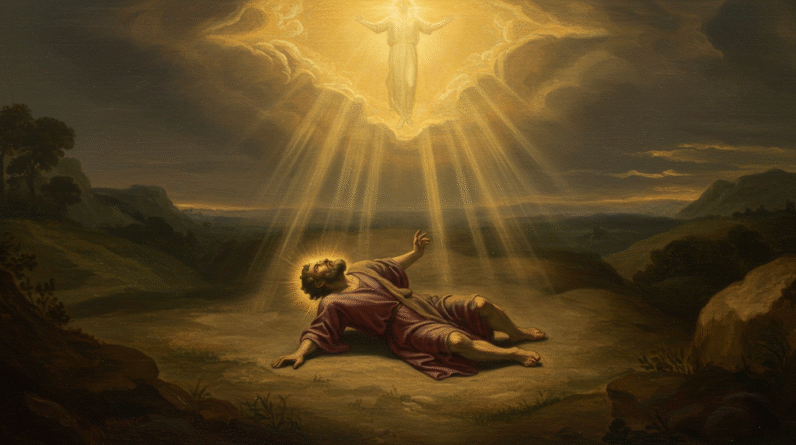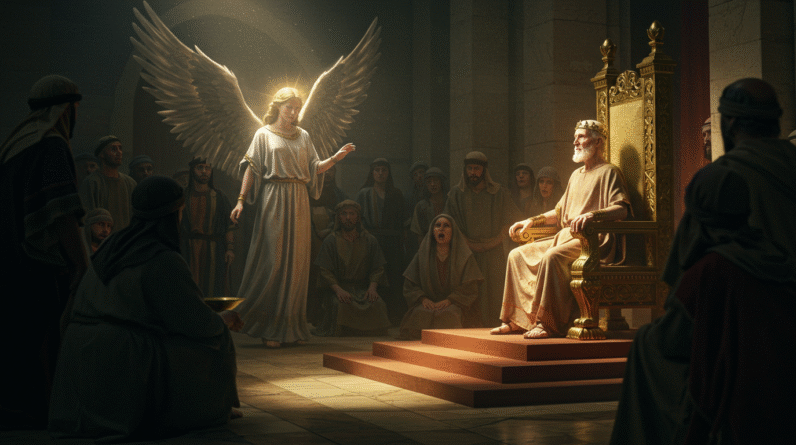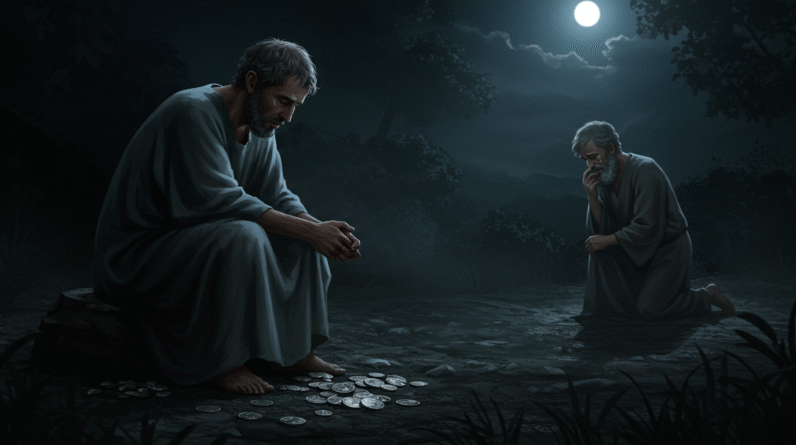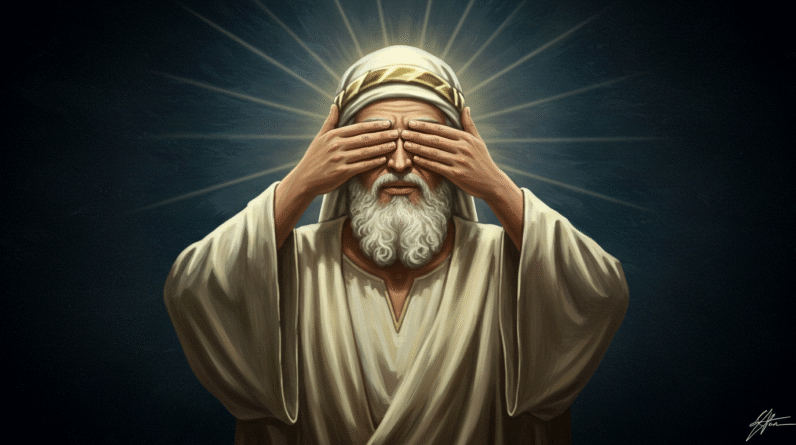Introduction
When you think about the trial of Jesus, your mind probably drifts to Pontius Pilate washing his hands of the situation, or maybe Judas betraying Jesus with a kiss. But one figure often gets less attention in this narrative: Herod Antipas. Herod’s encounter with Jesus during the trial is like a burst of tragic irony, swimming in layers of complexity and prophetic fulfillment. We’re going to dive deep into Herod and Jesus’ trial, exploring the mocking, the farce of justice, and how it differs starkly from divine authority.
The Historical Context of Herod and Jesus’ Trial
A Snapshot of Herod’s Character
Who was Herod Antipas? He ruled as tetrarch of Galilee and Perea, a man of political shrewdness and survival instincts. You know, the type of ruler who cared more about maintaining Rome’s nod of approval than seeking the approval of his own conscience. Herod was opportunistic, and this opportunism overlapped with his desire for entertainment and reputation. It’s said he loved luxury, decadence, and the thrill of holding power—even if that power was just a marionette controlled by the Romans.
The Landscape of Power
Picture the situation as a chessboard. On this board, rulers like Herod have their pawns, bishops, and knights, all in their place to maintain their version of ‘peace’ and ‘order.’ Herod’s role in Jesus’ trial is integral to understanding this complex relationship between Roman governance and Jewish leadership. Herod wasn’t just some supporting actor; his actions added a chilling layer of betrayal and irony to the entire drama, weaving human imperfections into divine plans Luke 23:7-12.
Herod’s Encounter with Jesus
An Interlude of Mockery
Herod didn’t see Jesus as a revolutionary leader or the Messiah. No, for Herod, Jesus was a curiosity, a sideshow attraction of sorts. Imagine him expecting to meet this so-called miracle worker, probably hoping for some display of magic to amuse his court. When Jesus stands silent before Herod, refusing to perform or speak, Herod is left with his expectations unmet. Instead of a miracle, what he gets is a canvas to project his cruelty.
The Mockery of Kingship
Herod and his soldiers dressed Jesus in elaborate robes, mocking the very idea of his kingship. It’s irony at its grimmest—human authority ridiculing divine kingship, thinking itself invincible. This theatrical act was a parody, a way for Herod to maintain an illusion of control even though the crowd before him stood as witnesses to his impotence. It’s as if human authority was laughing at its own fragile nature, unaware of the cosmic consequences of its choices Luke 23:11.
The Irony and Prophetic Fulfillment
Layers of Irony
The tragic irony of Herod and Jesus’ trial is thick enough to cut. Herod’s mockery was tinged with a prophetic hue, unknowingly fulfilling ancient prophecies about the suffering servant. Imagine thinking you’re merely mocking a man when, in fact, you’re fulfilling divine plans written long before your time. Herod, seeking a temporary spectacle, unwittingly became part of a grand narrative, illustrating just how short-sighted human authority can be.
Prophecies and Their Place
The mockery of Jesus hinted at prophecies that spoke of a Messiah who would be rejected and scorned before being ultimately sacrificed. If Herod had been aware, or perhaps if he even cared, he might have realized he was on the wrong side of a cosmic story. But his focus was earthbound, limited by ambition and vanity. His role in Jesus’ trial turns the lens on human choices and divine outcomes Isaiah 53:3.
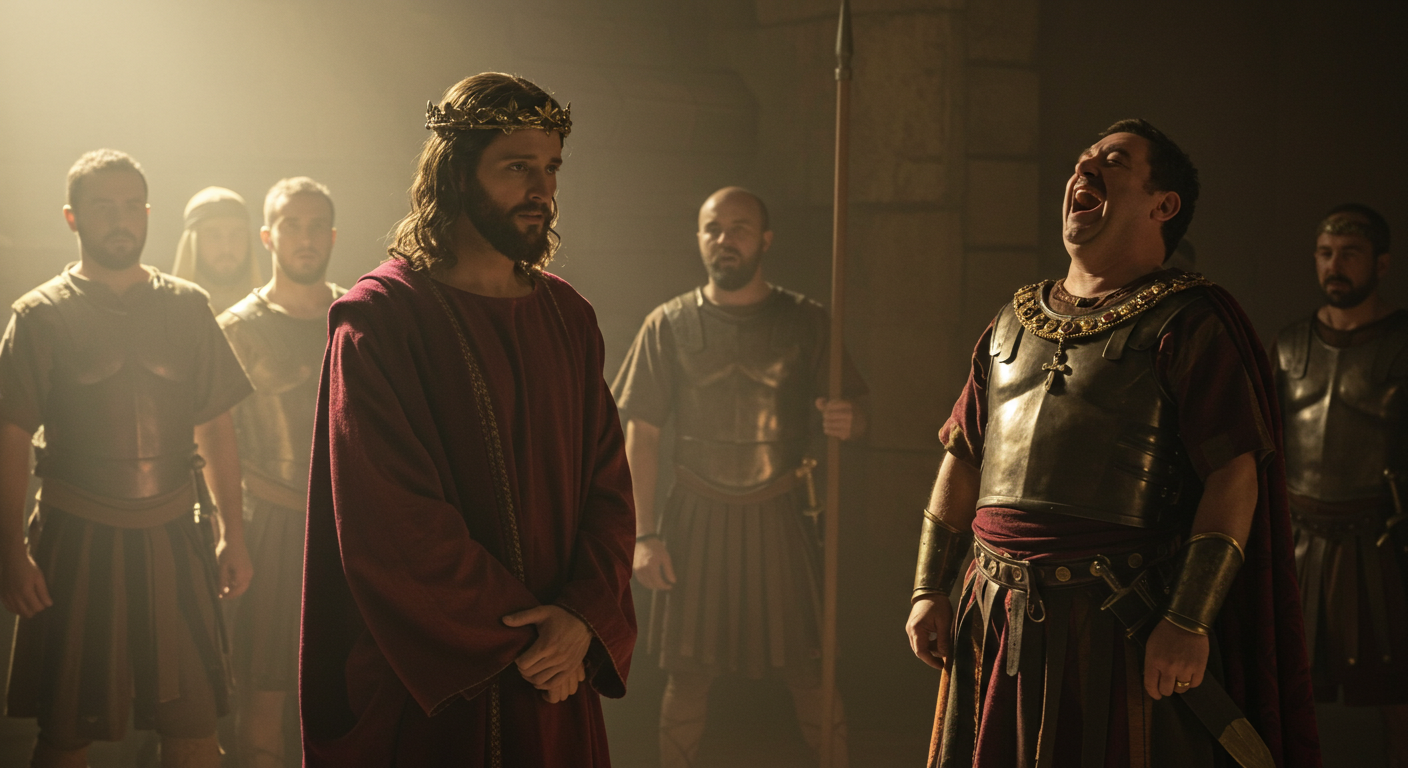
Contrasting Human Authority and Divine Kingship
The Fallibility of Human Authority
Herod and Jesus’ trial is also about exposing the fallibility of human power. While rulers like Herod thought themselves untouchable, their decisions were fleeting at best. Human authority, with its penchant for self-preservation, fears anything that challenges its status quo. Yet God’s kingdom, as represented by Jesus, stood unshaken by worldly pretenses.
Divine Authority: The Unseen King
In stark contrast, Jesus represented a different kind of kingship—one that didn’t need validation through spectacle or human praise. We see silence from Jesus during this mockery, which speaks volumes about the quiet confidence of divine authority. His kingship isn’t bound by earthly accolades; it’s rooted in timeless truths and eternal promises John 18:36.
The Cultural and Spiritual Undertones
A Clash of Cultures
There’s more at play here than just a legal proceeding. Herod and Jesus’ trial was as much about the clash of cultures as it was about legal authority. Herod represented a Hellenistic culture shaped by Roman influence, while Jesus stood for a spiritual realm that transcended geopolitical boundaries. In many ways, Herod’s mockery was emblematic of a cultural disconnect—a failure to understand what Jesus represented.
Spiritual Lessons
For you as a reader, Herod and Jesus’ trial teaches a spiritual lesson about leadership, humility, and accountability. Herod, captured by his desires and misguided sense of duty, forgot the essence of justice and mercy. The episode is a stark reminder of how earthly desires obscure spiritual truths and how divine justice ultimately prevails even when human systems fail.
Conclusion
Herod’s role in the trial of Jesus is a tapestry of irony, prophecy, and the perpetual clash between human and divine authority. It’s a story as relevant today as it was thousands of years ago. As you navigate through life, consider Herod’s role not just as a historical footnote, but as a lesson in morality, leadership, and spirituality.
Explore More
For further reading and encouragement, check out these posts:
👉 7 Bible Verses About Faith in Hard Times
👉 Job’s Faith: What We Can Learn From His Trials
👉 How To Trust God When Everything Falls Apart
👉 Why God Allows Suffering – A Biblical Perspective
👉 Faith Over Fear: How To Stand Strong In Uncertain Seasons
👉 How To Encourage Someone Struggling With Their Faith
👉 5 Prayers for Strength When You’re Feeling Weak

📘 Jesus and the Woman Caught in Adultery – Grace and Mercy Over Judgement
A powerful retelling of John 8:1-11. This book brings to life the depth of forgiveness, mercy, and God’s unwavering love.
👉 Check it now on Amazon
As a ClickBank Affiliate, I earn from qualifying purchases.
Acknowledgment: All Bible verses referenced in this article were accessed via Bible Gateway (or Bible Hub).
“Want to explore more? Check out our latest post on Why Jesus? and discover the life-changing truth of the Gospel!”



